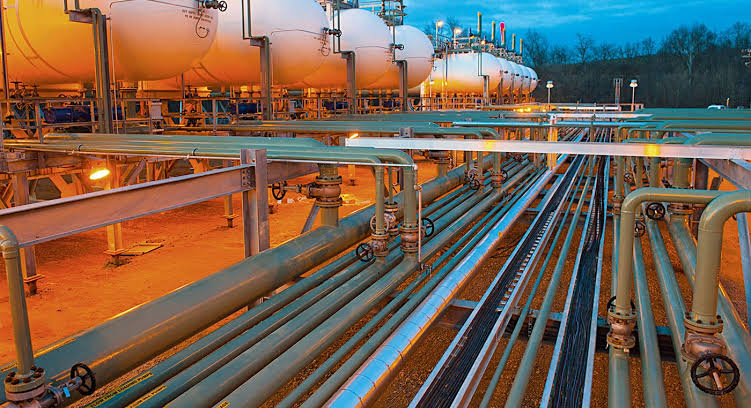M Azizur Rahman
Published:2024-11-26 07:48:38 BdST
RLNG import from IndiaPetrobangla cancels ongoing negotiations
The interim government has cancelled ongoing negotiations with several companies, including a couple of Indian ones, over inking contracts to import re-gasified liquefied natural gas (RLNG) from India through cross-border pipelines.
State-run Petrobangla has cancelled the negotiations in line with directives from the Energy and Mineral Resources Division under the Ministry of Power, Energy and Mineral Resources, said sources.
The potential deals that got axed during the negotiation stage include RLNG import by Petrobangla from India's privately-owned H-Energy and that by Bangladeshi private firm Dipon Infrastructure Services from GAIL, a state-run corporation in the neighbouring country.
Both Petrobangla and Dipon Gas had been involved in negotiations over the past several years to import RLNG via cross-border pipelines, said sources.
With the two deals, India was eyeing its emergence as the world's lone RLNG exporter by laying down 265 kilometres of cross-border pipelines. GAIL and H-Energy were planning to supply RLNG after importing LNG from global suppliers.
Market insiders said both the Indian companies had moved to export RLNG to Bangladesh having noticed the sluggish LNG consumption in their country over the past several years.
India imported around 23.3 million tonnes of LNG during the fiscal year 2023-24, which was 7.17 percent lower than its highest import volume of 25.1 million tonnes in FY21, according to the country's Petroleum Planning and Analysis Cell. Unlike Bangladesh, India's fiscal year is from April to March.
After importing its highest volume of LNG in FY21, India witnessed a slide in imports mostly due to LNG price spikes in the international market and Russia's invasion of Ukraine.
The two aforementioned Indian companies were to export around 1.6-2 million tonnes per year (MTPA) of RLNG to Bangladesh initially. The figures could have been increased on the basis of negotiations with the parties concerned.
H-Energy, a subsidiary of Hiranandani Group, was eyeing to supply half of the volume, 0.8-1 MTPA, while the remaining half was to be exported by GAIL.
H-Energy intended to supply RLNG from Digha in West Bengal to Khulna in Bangladesh by laying 155km cross-border pipelines from East Midnapore's Kanai Chatta to Srirampur. 90km pipelines were to be laid in India and 65km in Bangladesh.
The company was to lay the pipelines at its own expense, while Petrobangla was supposed to pay the wheeling charge for using those to import RLNG.
H-Energy's RLNG selling price was set to be linked to Brent Crude, keeping the price flexible to adjust with price changes in the international market.
On the other hand, GAIL was supposed to supply RLNG to Bangladesh's south-western Jashore district through the Benapole border after laying 110km cross-border pipelines. 65km pipelines were to be laid in India and 45km in Bangladesh.
The corporation was to lay the pipelines in India at its own expense, while Dipon Gas was supposed to bear the expenses of doing so in Bangladesh.
"Petrobangla was at the final stage of inking RLNG import deals with H-Energy. All relevant details, including the mode of payment, pipeline management, RLNG prices, and so on, have already been discussed," said a senior Petrobangla official.
H-Energy was supposed to supply RLNG to Bangladesh within two years of signing the deals, which included laying pipelines, RLNG purchase, and sales, he said.
Petrobangla was expecting to get RLNG from H-Energy by 2027, said the official.
He further said the RLNG from H-Energy was supposed to be used mainly to feed the 800MW Rupsha combined-cycle power plant, owned by the state-run North West Power Generation Company, for 22 years. The remaining RLNG was to be used in industries and other gas-fired power plants in the south-eastern region, he added.
The Asian Development Bank provided around $600 million, and the Islamic Development Bank nearly $200 million, to implement the Rupsha power plant project with two gas-fired units, each with a capacity of 400MW. The Bangladesh government provided the remaining $150 million.
GAIL could have started supplying RLNG in less time if it could avoid the major hassle of land acquisition to lay down the pipelines, said a top Dipon Gas official.
Dipon Gas was eyeing to utilise funds from Saudi Arabia to implement the pipeline project on the Bangladesh side and then import RLNG.
The company was planning to sell RLNG initially to Petrobangla and other interested private clients, including industries and power plants. It also had plans to set up a fertiliser factory and a power plant using GAIL's RLNG.
Keeping this end in view, Petrobangla inked a memorandum of understanding with H-Energy a couple of years ago. It also signed the first agreement with Indian Oil Corporation in 2018 for the same purpose. However, the deal was later shelved and still remains so.
Unauthorized use or reproduction of The Finance Today content for commercial purposes is strictly prohibited.


